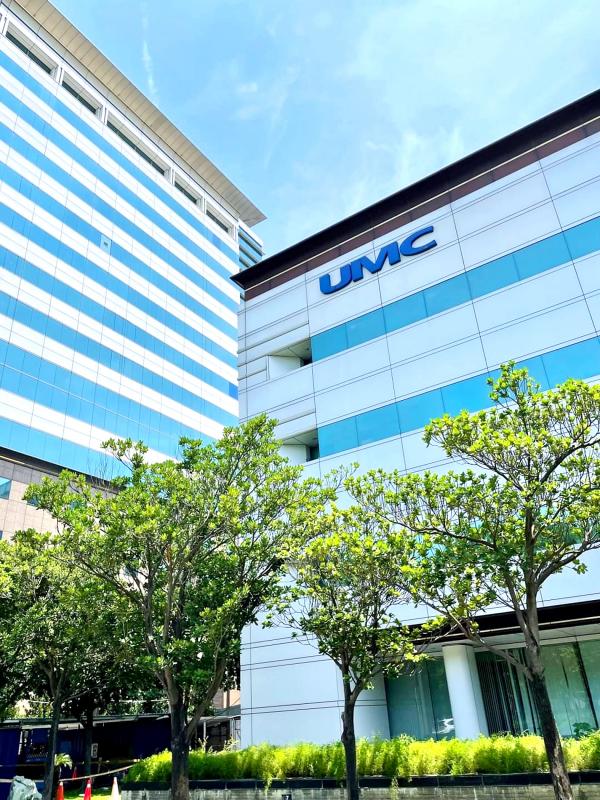Contract chipmaker United Microelectronics Corp (UMC, 聯電) yesterday raised its capital spending plan for this year by more than 66 percent to US$3 billion to expand capacity, including 28-nanometer chips, as customer demand continued to outpace supply.
It expects the investment to boost capacity by 6 percent from last year.
UMC spent US$1.8 billion on new manufacturing equipment and facilities last year, about US$500 million less than its original estimate due to delays in equipment delivery.

Photo: Grace Hung, Taipei Times
“We believe that current semiconductor mega trends — continuing penetration of 5G phones, acceleration of electric vehicle adoption and proliferation of AIoT devices [artificial intelligence of things] — will continue to drive higher demand for silicon content,” UMC co-president Jason Wang (王石) told investors via a teleconference.
“That will lead to higher demand for foundry capacity and technologies not only for leading nodes, but also for UMC’s focus markets in the foreseeable future,” he said.
As Chinese chipmakers are also expanding 28-nanometer capacity, Wang said that an oversupply could set in in 2023, but it would be mild and short, as more applications gradually migrate to 28-nanometer chips from older-generation technologies.
The company has signed long-term supply agreements with customers, with 80 percent of 28-nanometer chips covered by those agreements, Wang said.
UMC’s revenue growth is forecast to match or even outpace the foundry industry’s 20 percent growth this year, he said.
That was an upward revision from a prior estimate of 12 percent growth for foundry.
The chipmaker attributed the revenue growth to annual price hikes of about 15 percent, a similar increase for last year amid a lingering chip crunch.
However, UMC expects surges in labor and raw material costs to offset most benefits from wafer price increases this year, suggesting little room for more gross margin growth.
Factory utilization would remain 100 percent this quarter, it said.
This quarter, gross margin is expected to rise to about 40 percent, from 39.1 percent in the previous quarter, UMC said.
The increase is much slower than a 5 percent uptick quarter-on-quarter in blended average selling prices for this quarter.
Net profit expanded 42.5 percent to NT$15.95 billion last quarter from NT$11.2 billion. That translated into earnings per share (EPS) of NT$1.3, up from NT$0.92 a year earlier.
UMC’s net profit last year soared 91 percent to NT$55.78 billion, from NT$29.29 billion in 2020. EPS rose to NT$4.57 from NT$2.42.
Revenue expanded 20.5 percent to NT$213.01 billion from NT$176.82 billion in 2020.
UMC said that 28-nanometer chips, the biggest revenue contributor last year, accounted for 20 percent of the total last year, up from 14 percent in 2020.

Hon Hai Precision Industry Co (鴻海精密) yesterday said that its research institute has launched its first advanced artificial intelligence (AI) large language model (LLM) using traditional Chinese, with technology assistance from Nvidia Corp. Hon Hai, also known as Foxconn Technology Group (富士康科技集團), said the LLM, FoxBrain, is expected to improve its data analysis capabilities for smart manufacturing, and electric vehicle and smart city development. An LLM is a type of AI trained on vast amounts of text data and uses deep learning techniques, particularly neural networks, to process and generate language. They are essential for building and improving AI-powered servers. Nvidia provided assistance

GREAT SUCCESS: Republican Senator Todd Young expressed surprise at Trump’s comments and said he expects the administration to keep the program running US lawmakers who helped secure billions of dollars in subsidies for domestic semiconductor manufacturing rejected US President Donald Trump’s call to revoke the 2022 CHIPS and Science Act, signaling that any repeal effort in the US Congress would fall short. US Senate Minority Leader Chuck Schumer, who negotiated the law, on Wednesday said that Trump’s demand would fail, while a top Republican proponent, US Senator Todd Young, expressed surprise at the president’s comments and said he expects the administration to keep the program running. The CHIPS Act is “essential for America leading the world in tech, leading the world in AI [artificial

DOMESTIC SUPPLY: The probe comes as Donald Trump has called for the repeal of the US$52.7 billion CHIPS and Science Act, which the US Congress passed in 2022 The Office of the US Trade Representative is to hold a hearing tomorrow into older Chinese-made “legacy” semiconductors that could heap more US tariffs on chips from China that power everyday goods from cars to washing machines to telecoms equipment. The probe, which began during former US president Joe Biden’s tenure in December last year, aims to protect US and other semiconductor producers from China’s massive state-driven buildup of domestic chip supply. A 50 percent US tariff on Chinese semiconductors began on Jan. 1. Legacy chips use older manufacturing processes introduced more than a decade ago and are often far simpler than

Gasoline and diesel prices this week are to decrease NT$0.5 and NT$1 per liter respectively as international crude prices continued to fall last week, CPC Corp, Taiwan (CPC, 台灣中油) and Formosa Petrochemical Corp (台塑石化) said yesterday. Effective today, gasoline prices at CPC and Formosa stations are to decrease to NT$29.2, NT$30.7 and NT$32.7 per liter for 92, 95 and 98-octane unleaded gasoline respectively, while premium diesel is to cost NT$27.9 per liter at CPC stations and NT$27.7 at Formosa pumps, the companies said in separate statements. Global crude oil prices dropped last week after the eight OPEC+ members said they would